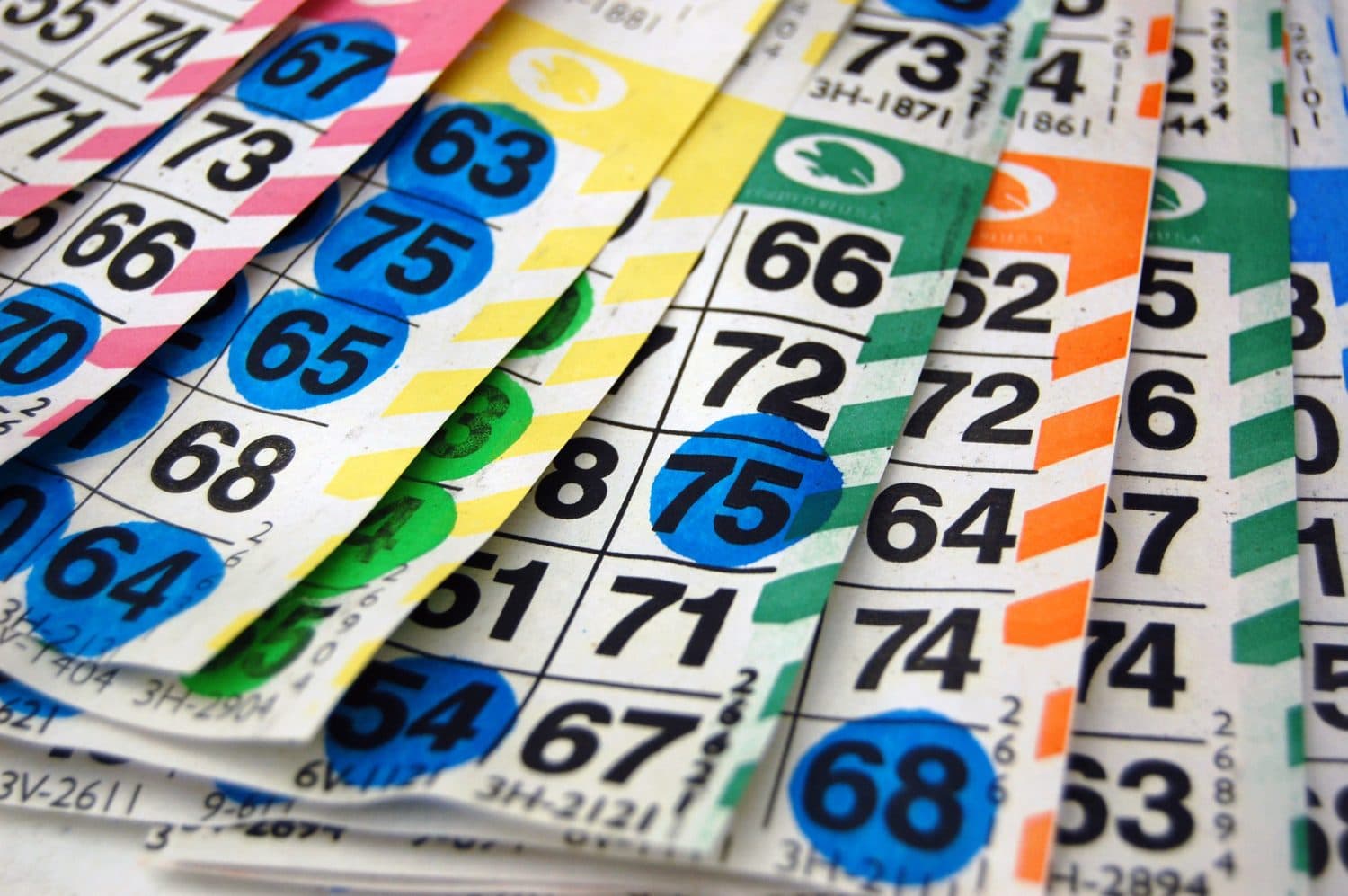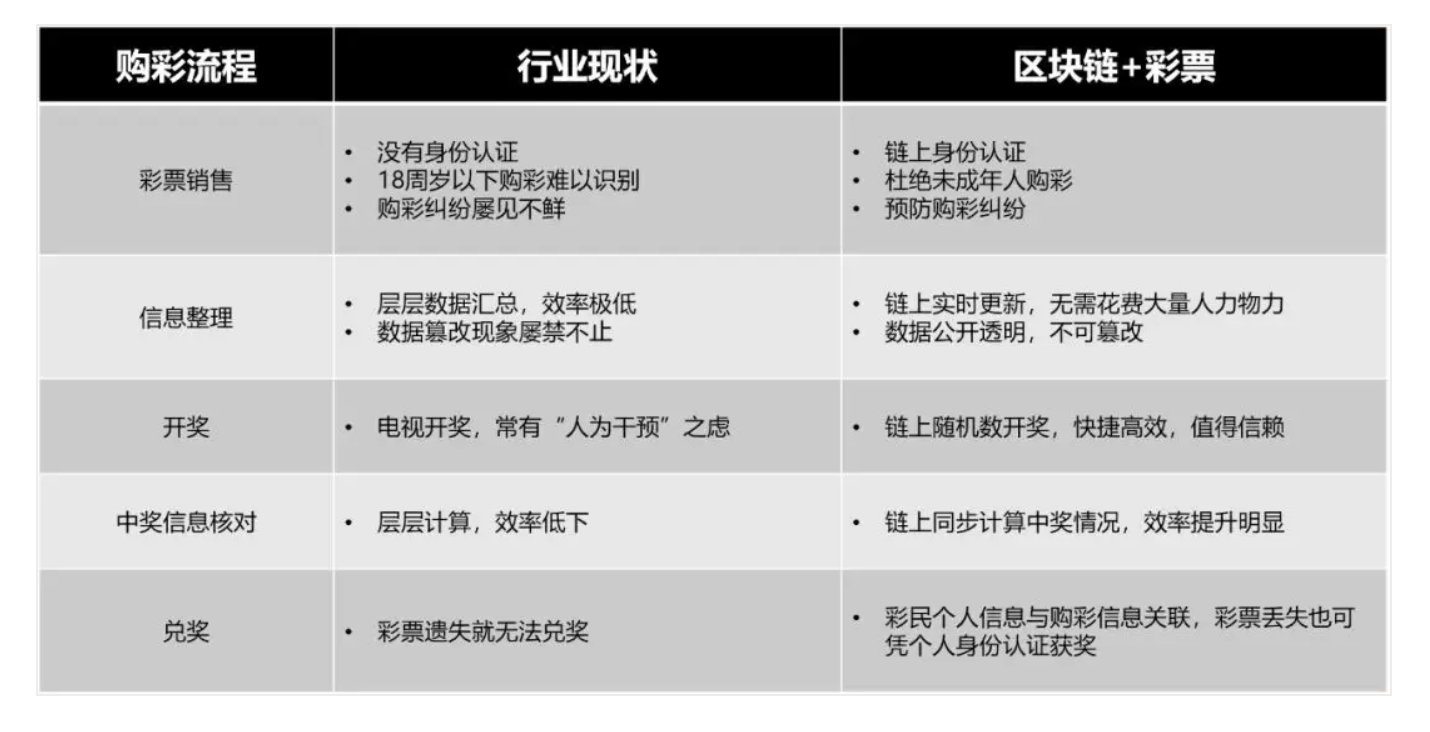Why does the lottery industry in the artificial age urgently need blockchain transformation?
Author: Ha World Technology
Source: Chain News
Lottery + blockchain is a new direction for the combined development of industries.
In recent years, with the development of blockchain technology and the pain points of the lottery industry, the use of blockchain to empower the lottery industry has begun to enter the mainstream.
- EU issues stablecoin ban: Risks cleared before any "global stablecoin" allowed to operate in the EU
- The whale moves frequently, this new block actually holds 900,000 bitcoins, which is equivalent to Satoshi's bitcoin holdings
- Bitcoin network sets another record: on-chain transaction volume exceeds $ 8.9 billion in 1 hour
As a new generation of technology, blockchain has many irreplaceable powerful functions, such as distributed data storage, point-to-point data transmission, etc., because of its immutable underlying logic, it also makes the blockchain traceable, certificate-saving, and trust mechanisms In many application scenarios, there is considerable room for development, which deeply matches the needs of the lottery industry.
After the People's Daily wrote "Blockchain as an important breakthrough in independent innovation of core technology", the cooperation model of lottery + blockchain has taken a new level.
In this article, we will describe in detail how blockchain can empower the lottery industry.

1 Status and problems of lottery industry
Since the official issuance of lottery tickets in 1987, China has cumulatively sold about 3.7 trillion lottery tickets.
According to figures released by the Ministry of Finance, as of 2018, the cumulative sales of welfare lottery tickets have exceeded 1.100 billion yuan, the cumulative sales of sports lottery tickets has exceeded 900 billion yuan, and more than 500 billion yuan of public welfare funds have been raised. In 2018, the revenue of public welfare funds reached a new high, reaching 131.3 billion yuan, and its proportion of fiscal revenue continued to rise, reaching 0.72%, which has made great contributions to all sectors of society.
At the same time, according to relevant media data statistics, the overall quarterly active user scale of the lottery service industry remained at 30-40 million in 2018.
It can be said that the entire lottery industry is in an upward and benign development state. But at the same time, we also see that there are many pain points in the lottery industry that need to be resolved.
The pain points of the lottery industry are currently focused on four major areas:
Credibility needs to be continuously strengthened
The lottery industry has always been a concern industry, but in recent years, due to some criminal factors, the credibility of the lottery industry has declined to a certain extent.
In June 2019, a Beijing court trial, Feng Lizhi, deputy director of the China Welfare Lottery Issuance Management Center, used the "lottery" to accept a bribe of 5.851 million yuan, abusing his power, resulting in the loss of 160.3161 million yuan in lottery business fees, causing major losses to national interests , Sentenced to 17 years.
Earlier, there was a lottery fraud in Shenzhen that shocked the country. A man used his position to maliciously tamper with the lottery data after the draw and attempted to forge the fact that the two-color ball won the first prize. The amount involved was as high as 33.05 million yuan.
Over the past 20 years, people ’s lifestyles have changed dramatically, and the lottery industry is still at the stage of artificial lottery, artificial lottery and artificial redemption. The changes in the industry cannot keep up with the advancement of science and technology , and affect lottery lottery drawing and redemption through technical means The incident happened many times, and the existence of a small number such as Feng Lizhi deepened the mistrust of lottery players in the lottery industry.
To eliminate this distrust, one requires time, and the other requires technology.
Further implementation of regulatory compliance
Due to the large number of lottery sales outlets and the large number of lotteries, there are still problems with the implementation of laws and regulations in actual lottery operations.
This kind of regulations is not implemented in the first and second tier cities, but the situation is still severe in a wide range of sinking markets.
On August 5, 2019, the Dongguan Tangxia Police successfully cracked this "Red God, Xixi Sports Lottery" APP online gambling case under the guise of physical gaming, and arrested 10 criminal gangs with a total amount of 16.7 million yuan. Participation There are about 14,000 betting staff across the country.
The "Red God Sports Lottery" model is very simple. It cooperates with many physical lottery lottery stores in third and fourth tier cities. When lottery players buy lottery in physical stores, they recommend this app to lottery people, calling it a regular lottery software. The "Red God, Xixi Sports Lottery" APP is just a group of criminals who set up privately to illegally accept the disguise of gambling by betting on football, lottery and other methods.
Attracted by the small profits, the scam partnered with some physical lottery operators to bring more than 14,000 people into the pit.
Therefore, in the process of actual lottery management, how to prevent lottery players from stepping on these pits is also a pain point for the industry.
High labor costs
Under the existing lottery ticket sales process, each link of the sales process is cumbersome and requires a lot of manpower. Not only the operation efficiency of the entire lottery ticket sales process is low, but also the problem of high labor costs.
According to data from the third-party Analysys China ’s Lottery Market Industry Analysis 2019, the current lottery industry ’s profit share is only 0.5% of the lottery printing in the upstream and mid-stream and less than 2% of the equipment supply, and channels, including entities Channels and paperless channels accounted for more than 20%. This is also the most costly part of the current lottery industry.
Saving high labor costs and obtaining higher operating efficiency are the third focus of the lottery industry.
Lost lottery tickets and other redemptions
Due to the low threshold for lottery purchases, the large number of outlets, and the large number of lotteries, it is difficult to achieve real-name authentication such as mobile phone number purchases, which has also led to the loss of lottery tickets and the use of lottery tickets by others.
On February 15 this year, the Intermediate People's Court of Fuyang City, Anhui issued a notice offering a reward of 460,000 yuan for the whereabouts of Pan Pan and Wang Wenjun's property. Behind this bounty announcement is a bizarre lottery case.
In 2012, Mr. Li, a citizen of Fuyang, entrusted the local lottery shop owner Pan Pan to buy lottery tickets on the phone. After winning more than 6 million yuan, he was jointly led by Pan Pan and Pan Pan's relative Wang Wenjun. Pan concealed the fact that he had won the prize from Li, handed the winning lottery ticket to his relative Wang, told Wang to misrepresent that he had won the prize, and risked an after-tax bonus of about 5 million yuan. Then Wang withdrew the cash in more than 10 banks in the urban area and hid them. After several trials and executions in this case, Pan and Wang have not returned the money.
The wealth is moving. Under the temptation of huge profits, there are always some twists and turns in the bright development of the lottery industry.
This is why the call for blockchain + lottery has become stronger.
2 Why Blockchain + Lottery Is the General Trend
As early as 2015-2016, the blockchain + lottery solution has been proposed, and some people in the lottery industry have begun in-depth research at that time.
But for some reason, this idea has not spread to the entire industry.
Until 2018-2019, the gust of blockchain + lottery really began to blow.
On April 4, 2019, the China Government Procurement Network released the "Announcement of Publicly Tenderable Electronic Lottery Research and Application Based on Blockchain Smart Contract Technology", which mentioned in the announcement that the lottery number is based on the welfare lottery electronic lottery. Based on the actual needs of various provinces, starting from the application scenarios in various provinces, breaking away from the traditional "technical formula" of technical thinking of electronic lottery, combining the core characteristics of financial blockchain technology, studying the means and models of applying blockchain smart contract technology to electronic lottery systems The key issue of the current lottery industry's electronic lottery system is that it is unfair and unauditable. The next generation lottery and lottery system technology is studied.
On April 13, 2019, the world's first blockchain lottery ticket opened in Kampala, Uganda. This blockchain lottery system is built on the basis of blockchain technology and is operated locally by MOBILELOTTO LTD in Uganda.
On October 28, 2019, the Shenzhen Welfare Lottery Issuance Center stated that it plans to conduct a "blockchain" technology lottery pilot to launch lotteries printed with personal information such as ID numbers or mobile phone numbers to promote real-name lottery tickets for lottery purchases. No worry. This is the first time that "blockchain + lottery" has been officially mentioned in China.
On the same day, "Shenzhen Evening News" first reported that Shenzhen Fucai will trially apply blockchain technology in April 2020, and called this a local lottery center's innovative attempt for "tech lottery".
Blockchain + lottery is coming menacingly, so what exactly is a blockchain? To put it simply, blockchain is a low-level technology, which has the characteristics of decentralization, data disclosure, and tamper resistance.
- Decentralized. To put it simply, blockchain technology does not rely on additional third-party management organizations or hardware facilities, and there is no central control. In addition to the self-contained blockchain itself, through distributed accounting and storage, each node implements self-verification, transmission, and verification of information. management.
- Data is transparent. The blockchain technology foundation is open source. Except for the private information of the parties to the transaction, the blockchain data is open to everyone. Anyone can query the blockchain data and develop related applications through the open interface. System information is highly transparent.
- Immutable. The blockchain is an open chain. As long as you cannot control 51% of all data nodes, you cannot manipulate and modify network data. This makes the blockchain itself relatively secure and avoids subjective and artificial data changes.
In addition to these, blockchain technology also has technical characteristics such as distributed storage, random numbers on the chain, and smart contracts that execute automatically. These characteristics are undoubtedly a good medicine for the current lottery industry, which can promote the development of the industry from multiple aspects such as information security, capital security, lottery interests, and identity authentication.
Moreover, this driving force is not in a certain link or in several links. It should be said that in the issuance, sales, lottery, and redemption of lottery tickets, in all links, the blockchain can promote the progress of the industry, and this kind of Progress is visual and perceptible.

3 How blockchain empowers the lottery industry
First of all, the blockchain is not a panacea, and it cannot solve all the problems faced by the lottery industry, but only provides a series of support for the lottery industry from a technical level.
So, how exactly does blockchain + lottery operate?
Let's talk about principles first.
The strong blockchain can use a strong encryption method to create an authentication infrastructure that can control the entire process of lottery purchases, lottery and redemption. It contains personal basic information of lottery buyers, lottery information entry, full redemption process information, lottery The actual reward situation of the prize, etc .; secondly, the private key is used to encrypt and sign the certificate; next, a hash value is created to verify whether the content of the certificate has been tampered with;
Finally, a private key is used again to create a record on the blockchain network to prove what the certificate has reached at some time.
Then use cases to explain to everyone.
past:
Pharaoh is a lottery player. When buying lottery, all Pharaoh can do is go to a physical store to buy a lottery ticket and wait for the lottery to be drawn. During the lottery, Pharaoh can only see the lottery on TV. Of course, if it is similar to scratch If you find that you have won the prize, Pharaoh ran to the physical store / redemption center to redeem the lottery.
But in the process, Pharaoh met many pits.
- There were some loopholes in the official lottery (hacked, corrupted), and Pharaoh failed to win.
- The owner of the physical store was called to help buy the lottery. After winning the prize, the boss swallowed the lottery ticket, and Pharaoh failed to win.
- I went to the physical store to buy a lottery ticket, but found that the lottery ticket was fake, and Pharaoh failed to win.
- On the way to redeeming, Pharaoh accidentally lost the lottery ticket, and Pharaoh failed to win.
- Pharaoh successfully redeemed the prize, but because he forgot to block the prize, he was discovered by relatives and friends.
right now:
Pharaoh came to the physical lottery store and realized one-click identity authentication through the blockchain. The process is very simple. After face recognition or ID card recognition, the authentication is completed. After confirming that Pharaoh meets the age of 18, Pharaoh bought one Zhang lottery, because everything needs to be on the chain, the physical store can not recommend to Lao Wang the lottery that is not on the chain. The "fake lottery scam" can no longer harm Lao Wang. At the same time, in the process, Lao Wang and the purchased lottery information Have completed the winding.
Next, during the lottery, random numbers were drawn on the blockchain without any human intervention. Pharaoh saw the entire process of lottery and was clear that there was no shady in the process.
After the prize draw was completed, Pharaoh won the prize successfully. As the information on the chain has been confirmed, neither the physical store owner nor the person with bad intentions can swallow the lottery privately, and the entire network knows that Pharaoh won the prize.
On his way to redeeming the prize, the paper lottery was lost accidentally. However, Pharaoh was not panic and proved his identity through the information on the chain. He successfully won the prize.
The entire network understands that Pharaoh has won the prize through hashing, but because the personal privacy chain is confidential, everyone knows that the identity has won the prize, but no one knows that this person is Pharaoh.
Pharaoh successfully received the bonus, avoiding all risks, everything is under control.

In this case, we can see that the blockchain has successfully exerted its efforts before the lottery's draw, in the draw process, and in the redemption link, and has optimized many of the disadvantages of the current lottery industry.
1. Before the draw:
Users can only purchase lottery after the on-chain identity verification is performed by the blockchain. The user purchases the lottery at the sales outlet and completes the ticket issuance. The sales outlet information, lottery betting information, amount, user unique identification and other data are stored on the blockchain. . On the one hand, it is to prevent minors under the age of 18 from buying lottery, and on the other hand, it is to confirm the identity of the lottery, which is convenient for subsequent redemption.
2. Lottery process:
The lottery will be drawn on the chain by a random number on the smart contract chain. Manual lottery will no longer be conducted in the past, avoiding the possibility of "human operation" during the lottery.
After the lottery is completed, the lottery information is stored on the chain through a smart contract. All information is open and cannot be tampered with. At the same time, the smart contract will automatically match the betting information and the lottery information. The winning situation will be displayed on the chain, but the winner's privacy will be through strong encryption. The form is hidden, and only the winner can confirm his or her winning situation through the private key.
3. Redemption process
The user completes the redemption by matching the on-chain identity verification with the smart contract's lottery information. The redemption process will be public on the chain, but the privacy of the redeemer will be encrypted.
So, here comes the question. After applying the blockchain technology, what is the progress for our lottery industry?
First, the credibility of lottery tickets has been further improved . Because the blockchain uses smart contracts to draw and redeem prizes, the "artificial lottery" model that has been criticized in the past will no longer exist, and the "shadow" will be nowhere to be seen. The amount of public welfare funds will also be disclosed on the chain. The net is visible.
In the past, we often heard about "human factors interfere with the lottery" and "modify the background data to illegally redeem the prize." In the era of blockchain + lottery, it has become impossible, and the lottery's trust in lottery will undoubtedly be further strengthened. .
Second, the regulatory compliance of the lottery industry will be further regulated . Through the blockchain technology, after all lottery sales outlets, lottery centers and regulators at all levels are linked, the behavior of the lottery business premises will be uploaded to the blockchain, and the regulator can view all the saved in the entire blockchain at any time. Data to immediately intervene in non-compliance.
For example, the "Red God Lottery" mentioned above intends to cooperate with some physical stores to sell illegal lottery tickets to lottery people. However, if the lottery operation is to be transmitted to the chain, physical stores will no longer be able to perform black box operations and can only sell legal lottery tickets. .
Third, labor cost optimization . After the introduction of blockchain technology, many processes of lottery purchase, lottery and redemption will be replaced by smart contracts. The time and labor cost of lottery redemption will be greatly reduced, and the labor cost will be greatly optimized. This also means that channel fees, which used to account for 20% of costs, will be greatly reduced, and public welfare funds will be greatly improved.
Fourth, the loss of lottery tickets and fraudulent collection will no longer bother lottery players . After the lottery is combined with the blockchain technology, the user's lottery information will be uploaded to the chain, and the lottery information will not only be stored offline, but will be tied to the corresponding user on the chain. The lottery buyer can directly pass The on-chain identity certificate has been redeemed, and the phenomenon of losing lottery tickets and other people's taking lottery prizes no longer exists.
As mentioned above, Mr. Li, a citizen of Fuyang, will no longer be misappropriated by lottery shop owners and can legally obtain his own benefits.
Based on the above, the author has made a comparison chart of traditional lottery and "blockchain + lottery", everyone can see at a glance.

4 Blockchain application of instant lottery
In the above, we put more emphasis on welfare lottery and sports lottery. Here, we analyze the blockchain application in the instant lottery.
The analysis of instant lottery is based on Hongbo shares.
Public information shows: Hongbo is a registered A-share listed company in Fujian with a stock code of "002229". Its main business is security printing. It is one of the leading companies in the Chinese lottery printing industry. The Welfare Lottery Center provides printing, sales, operations, and product development services.
On November 19, 2019, Hongbo shares (002229.SZ) announced that in order to promote the development of blockchain core technology-related business, Hongbo shares signed a strategic cooperation agreement with Shanghai Hashi Technology Co., Ltd. (“ Hashi Technology ''), It is planned to carry out in-depth cooperation in the fields of lottery and electronic tickets based on blockchain technology.
This cooperation will be concentrated in the field of instant lottery. Instant lottery tickets have a wide range of markets around the world, with the characteristics of easy entry, immediate purchase and immediate return.
In the lottery scene, lottery players buy instant lottery tickets, scrape out the patterns or numbers on the instant lottery tickets, and compare them according to the winning rules. The winning prizes will receive the corresponding prizes or prizes. Each operator will design the gameplay in accordance with the regulations of the country and region.
For example, our common scratching music is the representative of instant lottery.
Instant lottery passes value between strangers. The winnings flow from the lottery to the operator through the consignee, and the bonus flows from the operator to the lottery. Instant lottery flows from operators to lottery players as securities. Prize data and reward data are stored centrally in the operator's server.
Different from welfare lottery and sports lottery, that is, during the production of open lottery tickets, different teams are responsible for generating random numbers, awarding algorithms, awarding results, and printing tickets. Data flows between different teams, so the entire There is a risk of external hackers tampering with the data during the process.
In the actual operation process, all operators will pay special attention to data security and ticket security. In terms of technology and operating procedures, many links will be designed to ensure security and reliability. Once an external hacker invades and manipulates data, lottery operators will suffer heavy losses. .
But at the current stage, these design links are basically centered, which also leaves room for lawbreakers to operate.
For example, Eddie Tipton, the head of the security department of a lottery company in Iowa, USA, has tampered with data in 2007 and 2012, illegally manipulated lottery lottery procedures, and used fraud to win huge bonuses. .
To ensure the security of instant lottery, blockchain may be the best choice.
First of all, the instant lottery will be integrated with blockchain technology in the process of prize selection, printing, distribution, sales, prize checking, rebates, and statistics. In these processes, the data and information are realized through blockchain technology Chain to avoid data tampering.
Secondly, in the back-end links such as redemption and verification, blockchain technology can improve the technical difficulty of external hackers attacking the center server and tampering with data, and the risks of hackers are greatly relieved.
In addition, the blockchain can also help the instant lottery to realize the flexible joining and exit mechanism of remote business nodes and the review and audit functions of the lottery data by the regulatory node. This is also well understood. In the open lottery, the number of machines is responsible Different teams generating, awarding algorithms, awarding results, and printing tickets become different nodes on the chain. The blockchain provides effective means for tracking and non-repudiation in the meantime to assist supervision.
In addition to the above advantages, the blockchain cooperates with instant lottery tickets, and can also provide transparent access to lottery users, providing process and data visibility features to achieve open, fair, and just appeals. Its credibility has also been greatly strengthened.
The value of block chain + instant lottery has been recognized by the market. In response to the Shenzhen Stock Exchange's "Letter of Concern to Hongbo Co., Ltd.", the value of block chain technology in lottery and bills There are corresponding cases and market demands in the application of the industry. The cooperation between Hongbo Co., Ltd. and Hashi Technology is a decision made after careful consideration by the management, and it is necessary and feasible.
It can be said that the blockchain has really begun to blow a new air in the lottery field.
We will continue to update Blocking; if you have any questions or suggestions, please contact us!
Was this article helpful?
93 out of 132 found this helpful
Related articles
- ICT Researcher: Five Suggestions on China's Blockchain Legislation Supervision
- Fosun co-founder Liang Xinjun: Why is 2020 a turning point in the development of blockchain?
- "Zhejiang Shoot" applies blockchain technology to the auction of scientific and technological achievements for the first time
- How should the blockchain play? We talked to the Nobel Laureate in Economics
- Beijing financial technology pilot "regulation sandbox", analysts: digital currency is expected to enter the pilot
- How much BTC does Satoshi Nakamoto have, and where are they placed?
- US Treasury Secretary: Fed will not issue digital currency in five years, and does not oppose Facebook to create digital currency






